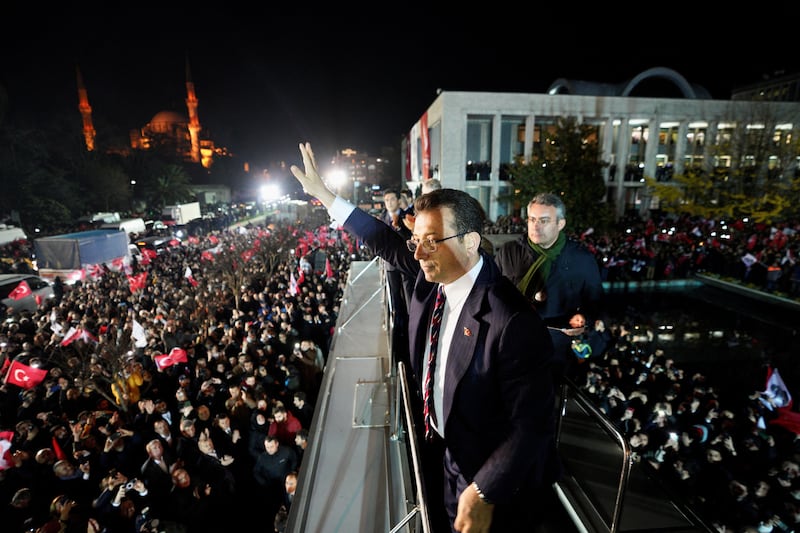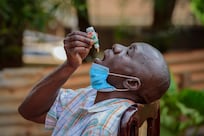How long is a political career? Some come and go in the blink of an eye. Others linger for a decade, maybe two. Then there are the fortunate few – like US President Joe Biden, who first won elected office in 1970 – who are able to hang around for a lifetime.
It’s too soon to say where Istanbul Mayor Ekrem Imamoglu will fall in this spectrum, but we are now less than two weeks away from a vote that could determine his political destiny. A little-known district leader when he first ran for Istanbul mayor for the main opposition Republican People’s Party (CHP) five years ago, Mr Imamoglu quickly built a sizeable following.
Voters were drawn by his confidence on the stump and willingness to challenge Turkish President Recep Tayyip Erdogan and the governing Justice and Development Party (AKP).
Like Mr Erdogan and many AKP leaders, Mr Imamoglu is originally from the conservative eastern Black Sea region, and he came off as a smart marriage of traditional and worldly, a stable family man with grand plans for Turkey’s most important city.
He barely edged a former prime minister in the initial March 2019 vote, then won handily in the redo, solidifying the CHP’s local elections triumph. Afterwards, Mr Imamoglu was hailed as the future of the opposition, even of Turkish politics – the vanguard of a new generation of globally minded leaders.
Yet as I detailed last month, the cards may now be stacked against him, with an untested CHP leader, reports of internal squabbling and a divided opposition running multiple candidates.
In addition, rising inflation, sky-high rents, the lira’s devaluation and few opportunities have in recent years prompted many probable CHP supporters to seek their fortunes abroad.
This includes younger voters; a January report found that the number of graduates of Istanbul’s top secondary schools who attend university abroad has skyrocketed. In 2020, just three per cent of graduates of Galatasaray, a top school in central Istanbul, studied abroad; today it’s more than a third.
The AKP chose former environment minister Murat Kurum as its Istanbul candidate, an intentionally unexceptional choice meant to set up a face-off between Mr Imamoglu and Turkey’s President, according to political analyst Ceren Kenar. Mr Erdogan seemed to lean into this idea last week when he suggested at a youth event that this election would be his last.
Some insiders say the 70-year-old President has privately expressed plans to run in the next general election, set for 2028, so this may have been mainly an attempt to generate media attention and electoral support. If the 52-year-old Mr Imamoglu is able to notch a third consecutive victory over the AKP, he’ll cement himself as the top challenger to Mr Erdogan in that next vote.
But if he loses control of Turkey’s cultural and financial capital after just one term, handing the powerhouse city of 16 million back to the AKP, he risks becoming a momentary blip, a brief interregnum in conservatives’ long reign. Of course, the next election is not for four years, a political eternity in which anything could happen.
But with Mr Imamoglu out of office, his star would surely fade. He could try to take over the CHP leadership, but generating adequate support would be a tall task after losing the crown jewel of Turkish cities. He may never be able to regain his 2019 sheen; political careers have ended on lesser defeats. The opposition would be faced with the possibility of Mr Erdogan putting yet another of its most promising figures out to pasture.
Deniz Baykal served as foreign minister in the mid-90s and led the CHP from 2002 to 2010, but was never able to defeat the AKP or rise any further than speaker of parliament. His successor, Kemal Kilicdaroglu, oversaw a slow erosion of CHP support over a dozen years as chief that ended with his stinging defeat last year.
Muharrem Ince briefly emerged as a major figure during his 2018 run for president, only to be trounced by Mr Erdogan. Meral Aksener will be 71 by the time the next election rolls around, and her nationalist IYI Party may be on the verge of collapse.
There’s also perhaps the opposition’s most charismatic figure of the past dozen years, Selahattin Demirtas, though the former leader of Turkey’s main pro-Kurdish party was mainly defeated by the judicial system: since 2016 he has been in prison on charges of spreading propaganda for the outlawed Kurdistan Workers’ Party (PKK).
That Mr Imamoglu will soon join this list is far from a done deal. The AKP is vulnerable in Istanbul and beyond. Ankara and Izmir seem likely to go again to the opposition, while Kurdish parties will probably take the key south-eastern cities (though whether their candidates will be allowed to stay in office is another matter).
It goes without saying that Turkey’s local elections have less effect than general elections, which involve the selection of the national leadership. But every now and then they take on a much greater symbolic import. In 2014, for instance, they arrived months after a massive wave of anti-Erdogan protests had swept the country.
In the end, the tightly contested vote involved electoral violence, charges of vote rigging, and a massive election-night blackout that may have decided the outcome in the AKP’s favour. “I am not joking,” then-energy minister Taner Yildiz told journalists, explaining the power cut and creating countless memes. “A cat entered the power distribution unit.”
Who knows whether wildlife will come into play this time around, but right now Istanbul is neck-and-neck. Most recent polls give Mr Imamoglu a slight edge, but a survey from Metropoll shows the incumbent has lost support among Kurdish voters (35 per cent to 32 per cent) and IYI supporters (64 per cent to 45 per cent).
The AKP’s aggressively nationalist stance tends to portray those who support Kurdish movements as traitorous, which puts Mr Imamoglu between a rock and a hard place: if he denounces the Kurdish movement, he is likely to lose crucial votes; if he fails to do so, as he did in a video clip that went viral early this month, he exposes himself to allegations of supporting terrorism.
At campaign stops, Mr Erdogan has been hammering home the nationalist message and the opposition’s disarray. "No change has been able to cure the political exhaustion of the CHP,” he said last week. “Everyone who comes and goes just makes things worse.”
Might Mr Imamoglu be the next to go? We may know by April 1.





